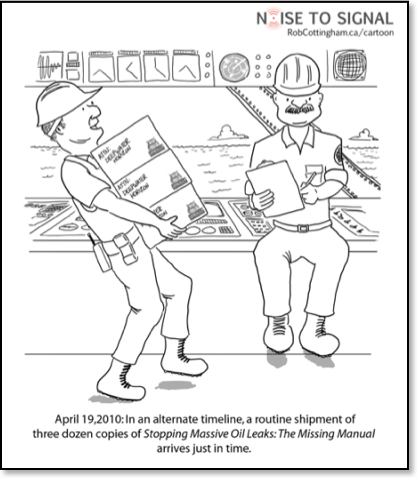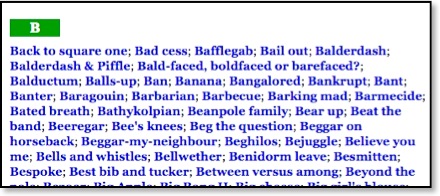indexing
Indesign EPUB index indenting solution
06/13/13 10:15
You may not like how the default InDesign index
subhead indenting looks. You can read how to fix
it
here.
InDesign CC will do live ebook indexes!
05/07/13 11:40
We are excited to announce that the next version of
InDesign, InDesign CC (Creative Cloud), will be able
to use embedded index markers to create live linked
ebook indexes, using the EPUB export.
The linked epub index feature is illustrated live at Terry White's Top
Five Favorite feature video at
https://www.youtube.com/watch?feature=player_embedded&v=4pWMKGDpbnc
Terry White is Adobe's Worldwide Creative Suite Design Evangelist.
Dave Ream and I met with the Adobe InDesign Engineers in September last year to facilitate this feature, and ASI is ecstatic
that Adobe was able to implement it in time for this release of InDesign. Adobe's Chris Kitchener and Douglas Waterfall are heroes to the indexing community for their work to get this feature live and ready to go.
If you want to thank Adobe for this feature, there is a commenting feature on Terry White's blog. Leave a note for Terry about how exciting this is, and how much indexers appreciate it.
http://terrywhite.com/whats-new-in-photoshop-cc-illustrator-cc-indesign-cc-and-muse-cc/#comments
You can also tweet the news using the hashtag #indesignindexingrocks
and #indexing, mentioning our Facebook URL:
https://www.facebook.com/pages/American-Society-for-Indexing/173798816017719
Please help us thank Adobe by leaving a comment on ASI’s Facebook page. We'll be sure to send a link to Chris,
Douglas, and the Adobe team.
This feature will only be available in the Creative Cloud version of InDesign. Desktop versions, ending at CS6, will not have this
capability. InDesign CC is expected to ship through subscription in late June.
The linked epub index feature is illustrated live at Terry White's Top
Five Favorite feature video at
https://www.youtube.com/watch?feature=player_embedded&v=4pWMKGDpbnc
Terry White is Adobe's Worldwide Creative Suite Design Evangelist.
Dave Ream and I met with the Adobe InDesign Engineers in September last year to facilitate this feature, and ASI is ecstatic
that Adobe was able to implement it in time for this release of InDesign. Adobe's Chris Kitchener and Douglas Waterfall are heroes to the indexing community for their work to get this feature live and ready to go.
If you want to thank Adobe for this feature, there is a commenting feature on Terry White's blog. Leave a note for Terry about how exciting this is, and how much indexers appreciate it.
http://terrywhite.com/whats-new-in-photoshop-cc-illustrator-cc-indesign-cc-and-muse-cc/#comments
You can also tweet the news using the hashtag #indesignindexingrocks
and #indexing, mentioning our Facebook URL:
https://www.facebook.com/pages/American-Society-for-Indexing/173798816017719
Please help us thank Adobe by leaving a comment on ASI’s Facebook page. We'll be sure to send a link to Chris,
Douglas, and the Adobe team.
This feature will only be available in the Creative Cloud version of InDesign. Desktop versions, ending at CS6, will not have this
capability. InDesign CC is expected to ship through subscription in late June.
Theodore C. Hines Award speech
04/21/13 11:22
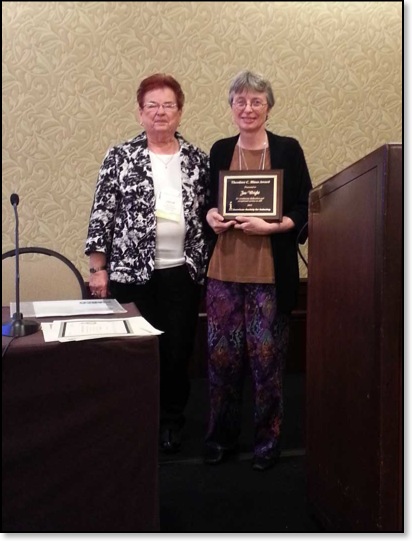
My great pleasure to receive the Hines award from Janet Perlman, introduced by a choked-up Pilar Wyman. Touched me to my very soul.
I can’t tell you how much it means to me to have Janet Perlman be the person up here with me. Janet was one of the first people I met at my very first ASI conference, and I can still remember her coming up to me and saying ‘Tell me about embedded indexing.” That’s Janet – she made me welcome and she wanted to know about exciting things. And she still does. I value our twenty-year friendship so much, as I value those same two decades plus some in ASI.
ASI has been one of the reasons I could be an indexer, professionally, full time. That’s a simple statement, but the friends, the information exchange, the standards, the education, the mutual support, and the help we all give each other is invaluable. If you think about it, we are all competing for work with each other. And yet we get together, regionally and nationally, and share our techniques, our business skills, and our time with each other. That’s amazing, isn’t it?
Regardless of all the wonderful things Janet just listed, I truly feel that I wouldn’t be here without many other people. I feel they should be up here with me, right now, as I could not have done the things I have without them. If I could divide this award up, I would be giving pieces to:
- The DTTF team:
- David Ream, who has been working so hard on the IPDF spec, giving presentations everywhere he can to help push indexing and ebooks further, and writing tools to help ASI’s books wind up as ebooks, and being my mind-meld partner. He also forgives me when I misspell his name, which I appreciate.
- Michele Combs, right by Dave’s side making sure that the spec was good, and the most cheerful committee person ever. She is a true diplomat.
- Glenda Browne, who navigated the depths of the spec with our American team and made sure it was internationally great as well.
- Steve Ingle and his team who gave hours and hours to work with Dave to bring ASI’s ebooks to market-ready stage, test tools, and has been working on the web site updates.
- Mary Harper, who has kept the DTTF team sane, kept me sane in particular, kept our reports in order, can find any document we need, and always thinks about the diplomatic solutions or implications of the team’s actions. She is our heart.
- Ina Gravitz, who happily said about ebook testing: “I have no idea, but I am willing to learn” and has been managing the quality assurance program for ASI’s ebooks effort. There was a recent article that said ebook QA was essential but too few publishers do it. Ina put us ahead of the curve!
- Paul Sweum, who will forever be known as the man who knocked on Amazon’s doors.
- Charlee Trantino, who has been the greatest board liaison we could have had.
- Sheila Ryan, who has been mastering the art of the tweet, and has been documenting how to get through an Indesign linked index with Gale Rhoades.
- And Pilar Wyman… You all know she has been President this year, but over the last two years Pilar has gone way way above and beyond her official offices to be a force of nature, doing webinars, international presentations to publishers, and setting a course for where we need to go. We are a buzzword now due to her dynamite onstage presence and networking. Believe me, Pilar has been up late working on both her presidential duties, Skype conferences, resolving issues, and trying to get DTTF demos done, speeches ready, and materials prepared. She is amazing, and she has kept us going when personal troubles hit every member of the team over the last two years.
- The ASI board members, who were visionaries and decided we needed to do something, to act now, about indexing in the ebook age. Frances Lennie, Richard Shrout, Pilar and now Ina have been the presidents who kept this ball rolling, and the board has been so supportive. We hope we have fulfilled your wishes, and I thank you all.
- Everyone who posts on LinkedIn or calls the team’s attention to important technologies and news. Yes, everyone of you! You have been our eyes and ears, since none of us can be everywhere at once or read everything there is. Thank you! You are too many to list, but I want you to know you are invaluable. Rebecca McCorkle has been gathering your news up every week, and letting everyone know.
- I want to also mention the importance of teaching, in which Janet, Nancy Mulvany and Sylvia Coates have all been my mentors. It’s been a joy to see students go on to become great indexers: Lucie Haskins, Teri Lefever, Kay Schlembach. I have been privileged to teach them. Every student has taught me something about our craft. It’s a two way learning experience. Let’s also remember Vicky Agee, who not only taught for decades, but was a major factor in making sure that anywhere she lived, there was an ASI chapter going strong. We all wish her health and strength.
- And lastly, since this is going to sound like the Oscars if I go on any longer, I want you to know that my Mom and my husband Chris should be up here by my side. When I found out that I had won the Wilson award, I was at my Mom and Dad’s house. When I heard that I was being put forward for the Hines, I was again at Mom and Dad’s. Something about that house makes you win awards, I think. It’s too bad we are selling it now, but hey, if anyone here would like to put down an offer, it is an award-winning location! And as for Chris, those of you who know him, you know why he should be here too.
Thank you, again, to the Hines committee, and I am truly honored to receive this award.
I can't stand the blithe write-off
05/30/10 10:48
Jeremy Horwitz doesn't
get it at all:
The iBooks-formatted book Ratio by Michael Ruhlman, for instance, can be stretched to a 3518-page tome or reduced to 223, just shy of the actual book’s 244—mostly because it’s missing the original’s index. And thanks to a magnifying glass icon at the top right of every page, the index is arguably unnecessary: you can search for any word in the book and get a complete, clickable list of its occurrences, plus links to Google and Wikipedia, and an integrated dictionary that can define virtually any word you touch.
One word searches work SO WELL on Google, why not on an ebook?
The iBooks-formatted book Ratio by Michael Ruhlman, for instance, can be stretched to a 3518-page tome or reduced to 223, just shy of the actual book’s 244—mostly because it’s missing the original’s index. And thanks to a magnifying glass icon at the top right of every page, the index is arguably unnecessary: you can search for any word in the book and get a complete, clickable list of its occurrences, plus links to Google and Wikipedia, and an integrated dictionary that can define virtually any word you touch.
One word searches work SO WELL on Google, why not on an ebook?
And don't forget to consult the index
05/13/10 10:38
Felix gets to be in the index
03/14/10 17:01
From
Peg Boyle Single's
story of
her thesis and later book writing career, a
tribute to her dog Felix:
He had taken to snoring recently and the sound kept me company through final readings of my book, checking style sheets, and triple-checking Chicago Style formatting. I even took on the torturous task of self-indexing so that I could make sure that references to my four-legged writing partner made it into my book, something most
professional indexers would have rightly skipped.
He had taken to snoring recently and the sound kept me company through final readings of my book, checking style sheets, and triple-checking Chicago Style formatting. I even took on the torturous task of self-indexing so that I could make sure that references to my four-legged writing partner made it into my book, something most
professional indexers would have rightly skipped.
Menial?
01/19/10 10:22
From
MacWorld, Feb. 2010, p. 69, a review of a software
package called Pagehand:
Pagehand 1.0.6 has an elegant user interface that word processor rivals can't touch. The program's beauty is closely tied to its ease of use, but is also aristocratic in nature. The application is not meant for such menial tasks as creating indexes and outlines.
I feel somewhat peeved by this language, don't you?
Pagehand 1.0.6 has an elegant user interface that word processor rivals can't touch. The program's beauty is closely tied to its ease of use, but is also aristocratic in nature. The application is not meant for such menial tasks as creating indexes and outlines.
I feel somewhat peeved by this language, don't you?
Eat Your Books indexes cookbooks!
01/09/10 10:07
Tip of the
hat to Devon Thomas for this one:
Eat Your Books Indexes Cookbooks
Web site hopes to make cookbooks more useful
By Lynn Andriani -- Publishers Weekly, 1/4/2010 9:23:00 AM
As cookbooks come up against increasing competition from online recipe repositories, Web sites have sprung up attempting to reinvigorate the medium. There’s Cookstr’s database of cookbook content, Cookbooker’s social network for people to rate and review cookbooks, and now, Eat Your Books, a site that purports to make the cookbooks you already own more useful to you. Because there’s nothing worse than having a shelf full of cookbooks but no way of knowing instantly whether or not they contain a recipe for beef stew.
Eat Your Books is based on the idea that it’s easier to search the Internet for recipes than your own cookbooks, so it searches your cookbooks for you. Once you’ve added cookbooks to your virtual shelf on Eat Your Books, you can search through them by recipe name, type (e.g., chili, frozen desserts, soups), ingredient, occasion, ethnicity—in other words, many of the criteria that an online recipe site provides. The more cookbooks you’ve added to your bookshelf, the more recipes there are available to you, and there’s no limit to how many cookbooks you can put on your shelf. Eat Your Books doesn’t actually post recipes, but it does catalog every recipe in a given cookbook, and will give you the ingredient list. So far, the site has 16,112 cookbooks and 195,233 recipes indexed.
Brilliant idea to make indexing pay for itself!
Eat Your Books Indexes Cookbooks
Web site hopes to make cookbooks more useful
By Lynn Andriani -- Publishers Weekly, 1/4/2010 9:23:00 AM
As cookbooks come up against increasing competition from online recipe repositories, Web sites have sprung up attempting to reinvigorate the medium. There’s Cookstr’s database of cookbook content, Cookbooker’s social network for people to rate and review cookbooks, and now, Eat Your Books, a site that purports to make the cookbooks you already own more useful to you. Because there’s nothing worse than having a shelf full of cookbooks but no way of knowing instantly whether or not they contain a recipe for beef stew.
Eat Your Books is based on the idea that it’s easier to search the Internet for recipes than your own cookbooks, so it searches your cookbooks for you. Once you’ve added cookbooks to your virtual shelf on Eat Your Books, you can search through them by recipe name, type (e.g., chili, frozen desserts, soups), ingredient, occasion, ethnicity—in other words, many of the criteria that an online recipe site provides. The more cookbooks you’ve added to your bookshelf, the more recipes there are available to you, and there’s no limit to how many cookbooks you can put on your shelf. Eat Your Books doesn’t actually post recipes, but it does catalog every recipe in a given cookbook, and will give you the ingredient list. So far, the site has 16,112 cookbooks and 195,233 recipes indexed.
Brilliant idea to make indexing pay for itself!
Fact check and tag at the same time, as a contract business?
12/13/09 10:05
Paul
Spinrad has an interesting idea for a business
here:
Fact-Checkers and Certified Public Logicians
It's fantastic that so much written knowledge is becoming generally accessible and cross-linked these days, but this is just an intermediate stage-- a universal library on the way to becoming a universal brain. The missing piece is encoding the underlying meaning of the stored text, the deep-structure logic behind it. It's one of the oldest challenges in Computer Science, and there has been lots of progress and companies dedicated to doing this. Powerset, for example, has software that has parsed and can answer questions from all of Wikipedia.
The thing is, you really still need a person to get it most reliably right, because people understand the way the world works. Luckily, we already have people whose job is very close to doing this already-- they're called fact-checkers or researchers, and they work for every reputable publication.....
I have wondered for years, as magazines, newspapers, and other news organizations have been hemorrhaging money and employees, why someone hasn't gone into the contract fact-checking business. Like, it could be an extension of Snopes.com. There's a huge redundancy in every publication having their own research desks, so they could lay off all of their fact-checkers and then outsource the job to the new, independent company that the best of them then all go to work for. Meanwhile, the company could also be hired by anyone else. Then, when the public sees the "Fact-Checked by MiniTrue (SM)" seal on someone's independent blog, they know the information there has the same credibility as the big boys.
Now, what if these fact-checkers didn't just vet and correct the text? While they dig into the logic and accuracy of everything, as usual, they could also use some simple application to diagram the sentences and disambiguate the semantics into a machine-friendly representation. Just a little extra clicking, and they could bind all the pronouns to their antecedents, and select from a dropdown box to specify whether an instance of the string "Prince" refers to the musician Prince or to Erik Prince-- the president of XE, the company formerly known as Blackwater-- within an article that for whatever reason mentions both of them.
Then you would really have something. The text wouldn't just be fact-checked; its underlying meaning could be added into a shared pool of human knowledge, chained through, verified or denied, and used in other ways by any technology that may now exist or may exist in the future.
Fact-Checkers and Certified Public Logicians
It's fantastic that so much written knowledge is becoming generally accessible and cross-linked these days, but this is just an intermediate stage-- a universal library on the way to becoming a universal brain. The missing piece is encoding the underlying meaning of the stored text, the deep-structure logic behind it. It's one of the oldest challenges in Computer Science, and there has been lots of progress and companies dedicated to doing this. Powerset, for example, has software that has parsed and can answer questions from all of Wikipedia.
The thing is, you really still need a person to get it most reliably right, because people understand the way the world works. Luckily, we already have people whose job is very close to doing this already-- they're called fact-checkers or researchers, and they work for every reputable publication.....
I have wondered for years, as magazines, newspapers, and other news organizations have been hemorrhaging money and employees, why someone hasn't gone into the contract fact-checking business. Like, it could be an extension of Snopes.com. There's a huge redundancy in every publication having their own research desks, so they could lay off all of their fact-checkers and then outsource the job to the new, independent company that the best of them then all go to work for. Meanwhile, the company could also be hired by anyone else. Then, when the public sees the "Fact-Checked by MiniTrue (SM)" seal on someone's independent blog, they know the information there has the same credibility as the big boys.
Now, what if these fact-checkers didn't just vet and correct the text? While they dig into the logic and accuracy of everything, as usual, they could also use some simple application to diagram the sentences and disambiguate the semantics into a machine-friendly representation. Just a little extra clicking, and they could bind all the pronouns to their antecedents, and select from a dropdown box to specify whether an instance of the string "Prince" refers to the musician Prince or to Erik Prince-- the president of XE, the company formerly known as Blackwater-- within an article that for whatever reason mentions both of them.
Then you would really have something. The text wouldn't just be fact-checked; its underlying meaning could be added into a shared pool of human knowledge, chained through, verified or denied, and used in other ways by any technology that may now exist or may exist in the future.
Go add your opinion about online indexes
12/07/09 09:21
Dec 07,
2009: A Union Index?
I've been kicking around an odd idea ever since starting Rosenfeld Media—the idea of a union index, a compilation of all of our books' indices. Now that we've actually got a few books out (#6 is due in about six weeks), it's time to revisit the idea and consider the indices' collective potential.
Want to help me figure it out?
First, imagine a single, combined index—possibly a single page—that'd reference whichever books where an index entry occurred. Then picture the ability to filter that index by individual title. Now we're ready for some questions:
Go comment at Rosenfeld Media!
I've been kicking around an odd idea ever since starting Rosenfeld Media—the idea of a union index, a compilation of all of our books' indices. Now that we've actually got a few books out (#6 is due in about six weeks), it's time to revisit the idea and consider the indices' collective potential.
Want to help me figure it out?
First, imagine a single, combined index—possibly a single page—that'd reference whichever books where an index entry occurred. Then picture the ability to filter that index by individual title. Now we're ready for some questions:
Go comment at Rosenfeld Media!
The index from World Wide Words
12/06/09 09:18
Palin wins Golden Turkey Award from ASI
11/20/09 10:22
FOR IMMEDIATE RELEASE
ASI Announces Golden Turkey Award
Press Release
Sarah Palin's Book receives ASI's First Golden Turkey Honors
Wheat Ridge, CO (November 20, 2009)
The American Society for Indexing (ASI) wishes to present its Golden Turkey Award for misadventures in indexing to Sarah Palin and HarperCollins for Going Rogue. In these days of Google and full-text search, many people don't realize how crucial the art and science of indexing still is (see the comments at http://www.thedailybeast.com/...) for some particularly disturbing evidence of public failure to recognize the value of good finding aids). Palin's book performs a crucial public service. The inaccessibility of information in this text makes it clear to any reader that a good index is essential to a book's long-term value.
Sarah Palin's Going Rogue has no index at all - a brilliantly simple if deviant way of proving the need for an index, worthy of one who prides herself on being a bit of a maverick. The sheer difficulty of using Going Rogue for any purpose beyond that of a doorstop turns it into an ironically elitist text. Now, other tomes from diverse parts of the political spectrum have been published without indexes (most recently and egregiously, David Plouffe's The Audacity to Win). What makes Going Rogue stand out is its sheer importance. Whatever one thinks of Ms. Palin, no one can doubt that she was a principal player at the center of an historic campaign. Scholars of the political history of the early 21st century will have to consult this book, a task which the lack of an index has made nearly impossible. If Plouffe's account were compared to Eusebius of Caesarea's biography of the Roman emperor Constantine the Great, Palin would be Constantine's rival Maxentius, defeated at the Milvian Bridge. Valuable as Eusebius's manuscript is, late antique historians would kill for a first-hand account from Maxentius - and if it were 432 pages long, as Palin's Going Rogue is, and as full of public and personal incident, their first job would be to give it an index.
Why does any of this matter? If all one is going to do is read a book from front to back and then forget about it, indexes don't matter. But books are our way of storing and accumulating knowledge, checking facts, comparing viewpoints. It's very hard to do that without an index. What about full-text search? Well, all I can say is, how is that working out for you?
Electronic searches are very good at finding words, but they're bad at finding concepts. If you're looking for information on "agriculture," you might miss all sorts of valuable information that uses the term "farming." A good index, written by a professional indexer (who is an actual person with a brain, not a piece of software, although indexers use dedicated software programs to perform mechanical aspects of indexing such as accurate alphabetizing) will pull together all related concepts regardless of the words used to express them. Ever had the experience of entering a search term and getting 45,679 hits, and had no luck narrowing the parameters? An index will provide subentries for major terms in a text so you can find the aspect you're interested in. In other words, an index does the full-text search for you.
Why are books published without indexes? Publishers and authors usually cite time and cost as the reasons for putting out a book without an index. Neither is a very good excuse. Indexers go to work when the text has been finalized and is going through the final proofreading stage, so there's no need to tack on extra time to do the index. In a pinch, a good indexer can produce a satisfactory index to a 400-page work in three days. Indexes can add to the final cost of the book in two ways. First, the indexer usually makes between $1,000 and $1,500 for the index to a standard-size text. For a book with the projected sales of Going Rogue, this is hardly likely to break the bank. Second, depending on the book's length, including an index may require the publisher to add another quire or signature of pages, which will affect the paper and binding costs (this consideration is not an issue for e-books, which as the technology improves will be released with embedded indexes that hyperlink to relevant parts of the text). Palin's book has, on my count, at least seven blank pages available, which could have held a respectable index. (Plouffe's Audacity to Win, on the other hand, has none, and an index would have required an extra quire.) In any case, given that the index often helps sell a book (by giving potential buyers a taste of what's in store) and greatly improves its functionality and long-term value, leaving the index out is a false economy. That is why ASI awards its Golden Turkey to the publisher, as well as the indexer. HarperCollins deserves as much credit for Going Rogue's lack of an index as does Palin herself.
The "context" argument: Commentators on Palin's missing pages have suggested that she perhaps deliberately left out the index to foil "the Washington read," a practice whereby one skims the text by judicious consultation of the index, particularly for instances of one's own name. The Washington read, it is argued, results in snippets from the book being taken out of context. T. E. Lawrence (Lawrence of Arabia) refused to have an index for The Seven Pillars of Wisdom on this account, and the French literary establishment not infrequently argues against the use of indexes on this basis. (I would not have thought Sarah Palin would be inclined to side with Lawrence in particular or the French in general, so I assume, if she does indeed espouse this view, that she came to it via a different route.) In any case the argument is specious. Biased readers can take snippets of the book out of context without any assistance from the index; news coverage of Palin's book so far has made that abundantly clear. Rather than ensuring contextual reading, the abandonment of the index ultimately ensures a book's place on the remainder shelf - your own, or the bookseller's.
So congratulations are due to both Sarah Palin and HarperCollins for their outstanding demonstration of why every serious book needs an index. ASI salutes you.
~~~~~~~~~~~~~~~~~~~~~~~~~~~~~~~~~~~~~~~~~~~~~
About American Society for Indexing
ASI is the only professional organization in the United
States devoted solely to the advancement of indexing,
abstracting, and database building. Come visit us
and learn more about indexing at www.asindexing.org
This just in on ASI-L:
As president of ASI I am the author and responsible for its content, as I am for all ASI messages that are distributed. The message is emphatic (and nonpolitical): Going Rogue is an important contribution to political history and as such it should have had an index. I do not apologize for that message in any way. Promoting indexes is part of my job, and so far we have had an overwhelming non-ASI reponse to the posting from people wanting to know more about indexing.
Best, Kate Mertes
Kate Mertes Mertes Editorial Services 118 N. West Street Alexandria, VA 22314 703-549-4574 kmertes@hotmail.com www.katemertes.com
Sarah Palin's book? No index in it
11/12/09 10:11
A
transcription from Countdown with Keith Olbermann and
Richard Wolfe, last night, about 55 minutes into the
program. I will link to a video clip if I can find
one.
Olbermann:
The book, no index, five chapters - in Time the speculation was two-fold here about why there was no index in it. It would force people to actually read through it because in Washington you never read the book except the parts that you find about yourself in the index. So there's no index; it's an "up yours" to the Washington Beltway establishment that there's no index to skip to.
Wolfe:
Ah, you know, I'm going to find that a hard one to agree with. You know, often when a book is crashed like this, and it may be a train wreck in a completely different sense, when they are rushing the schedule there is no time to put an index together because the page numbers are changing, there may also be a cost factor, she didn't want to waste the money on it, but there are other explanations than telling Washington to go screw itself. So I don't buy the index argument at this point, sorry.
Hisses for books with no indexes, and double hisses for using the phrase "waste the money on it."
Olbermann:
The book, no index, five chapters - in Time the speculation was two-fold here about why there was no index in it. It would force people to actually read through it because in Washington you never read the book except the parts that you find about yourself in the index. So there's no index; it's an "up yours" to the Washington Beltway establishment that there's no index to skip to.
Wolfe:
Ah, you know, I'm going to find that a hard one to agree with. You know, often when a book is crashed like this, and it may be a train wreck in a completely different sense, when they are rushing the schedule there is no time to put an index together because the page numbers are changing, there may also be a cost factor, she didn't want to waste the money on it, but there are other explanations than telling Washington to go screw itself. So I don't buy the index argument at this point, sorry.
Hisses for books with no indexes, and double hisses for using the phrase "waste the money on it."
Samples out for the Indexing Companion Workbook!
08/20/09 10:45
Check it
out here!
Can't wait to see the whole book, Glenda and Jon!
Can't wait to see the whole book, Glenda and Jon!
Indexes are not TOCs!
08/09/09 10:41
The help
system on my blackberry is about the most frustrating
thing I have ever seen. I can't find anything about
vibrating and ringing options. Oh, they are called
notifications! How intuitive! Each little help topic
has a link for INDEX -- and it leads to the table of
contents. NO NO NO!
What to do with old index cards?
05/19/09 10:41

A set of blinds made out of old library catalog cards! Take note, those of you who may still have shoeboxes!
Steven Johnson on digital reading, and self indexing
05/11/09 10:32
With
books becoming part of this universe, "booklogs" will
prosper, with readers taking inspiring or infuriating
passages out of books and commenting on them in
public. Google will begin indexing and ranking
individual pages and paragraphs from books based on
the online chatter about them. (As the writer and
futurist Kevin Kelly says, "In the new world of
books, every bit informs another; every page reads
all the other pages.") You'll read a puzzling passage
from a novel and then instantly browse through dozens
of comments from readers around the world,
annotating, explaining or debating the passage's true
meaning.
Think of it as a permanent, global book club. As you read, you will know that at any given moment, a conversation is available about the paragraph or even sentence you are reading. Nobody will read alone anymore. Reading books will go from being a fundamentally private activity -- a direct exchange between author and reader -- to a community event, with every isolated paragraph the launching pad for a conversation with strangers around the world.
This great flowering of annotating and indexing will alter the way we discover books, too. Web publishers have long recognized that "front doors" matter much less in the Google age, as visitors come directly to individual articles through search. Increasingly, readers will stumble across books through a particularly well-linked quote on page 157, instead of an interesting cover on display at the bookstore, or a review in the local paper.
Imagine every page of every book individually competing with every page of every other book that has ever been written, each of them commented on and indexed and ranked. The unity of the book will disperse into a multitude of pages and paragraphs vying for Google's attention.
Full article here -- great thoughtful stuff!
Think of it as a permanent, global book club. As you read, you will know that at any given moment, a conversation is available about the paragraph or even sentence you are reading. Nobody will read alone anymore. Reading books will go from being a fundamentally private activity -- a direct exchange between author and reader -- to a community event, with every isolated paragraph the launching pad for a conversation with strangers around the world.
This great flowering of annotating and indexing will alter the way we discover books, too. Web publishers have long recognized that "front doors" matter much less in the Google age, as visitors come directly to individual articles through search. Increasingly, readers will stumble across books through a particularly well-linked quote on page 157, instead of an interesting cover on display at the bookstore, or a review in the local paper.
Imagine every page of every book individually competing with every page of every other book that has ever been written, each of them commented on and indexed and ranked. The unity of the book will disperse into a multitude of pages and paragraphs vying for Google's attention.
Full article here -- great thoughtful stuff!
H.W. Wilson Award speech
04/24/09 11:14
(Here's a
copy of the speech I gave at the reception for the
Wilson Award. Many thanks to everyone attending --
you all made it such a night to remember!)
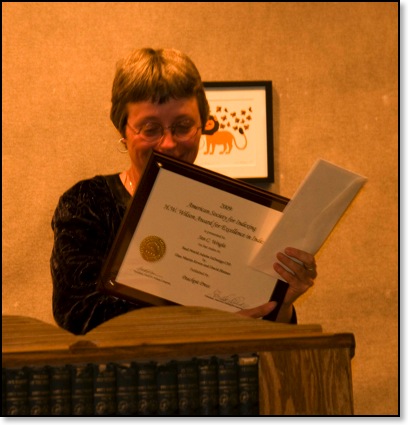
I want to thank this year’s Wilson Award Committee for honoring me and this book with the Wilson Award. And many thanks to H. W. Wilson for sponsoring the award. I know that the authors, Ole Kvern and David Blatner, are thrilled to see this index win as well. I want to thank PeachPit Press too, for supporting good indexing in their books. And not to make this sound like an Oscar speech, but I would like to thank my husband Chris for putting up with hard deadlines on books like these, and always cooking me dinner.
You probably would walk right past this manual, browsing in the software section here in Powell’s. After all, there are probably 20 other books on the shelf next to it, all about InDesign. It looks a lot like those other books, other than its massive weight. But it’s not.
What makes it different? Time, a good work process, and humor. Time defines this book in many ways. I’ve known David for at least 15 years, and I used to work for Ole Kvern, over twenty years ago. I have indexed all of his books save one. Ole was the person who taught me most of what I know about book layout, design, and the publication process. The same file handling techniques, process and practices we developed together in the Aldus documentation department in the late 80’s served us well as we put this book together. We laughed a lot when we worked together then, and we still do.
Time, in another way, defines this book. Like all software books, this one was written under a rapidly-closing deadline. Software books like this one have a limited life span. InDesign CS4, the program, is already out, and the next edition of this book is out on the shelves as well. (Also by David and Ole, and also indexed by me. Be sure to go find it on the shelves, there may be some new jokes in it.) These trade books live and make money for a very short time, while they still match the current version of the software. It’s critical to get them out as quickly as you can, as close to the software release data as possible.
For this edition, I wound up being more involved than I usually am. David and Ole were trying to document new features, and were worried about making their deadlines. Adobe had changed the appearance of much of the software’s interface, which meant taking new pictures (what we call screenshots or screen captures) of every single dialog box, tool box, and palette. Ole contacted me about two months before the indexing was to begin, and asked if I would help them out by doing the screenshots they needed. Two chapters were done, but the rest needed work. Since it was Ole, I said yes, because we used to do exactly this kind of work at Aldus. How hard could it be?
A lot harder than when I was thirty-something. I needed to have both the PC version of the program and the Mac version of the program, so that we would have both platforms illustrated in the images. I needed to create intricate Photoshop files with masks or layers to import into InDesign so that a certain Import dialog box would appear, and I could capture it. I had to clean the borders and make sure the dialog box contents were appropriate for each procedure they illustrated. It may be time for tri-focals; those pixels on the screen are much smaller than they used to be when I was younger. But I managed and replaced the images for about 3/4 of the book, saving Ole and David some precious time to finish the writing they needed to get done.
Then it was time for the indexing. A good working process also defines this book and its index. As we always do, Ole and David provided PDFs with temporary page numbers, working as fast as possible. We didn’t embed this index – we couldn’t. This is the classic tradeoff: choosing to embed vs. working with standard indexing. Yes, it would be great to have this index embedded, but there is never any time for this series to get the embedding done. David and Ole truly need to have access to the files until the very last minute, and if I had embedded the index, I would need to be editing at the same time they needed the files to prepare for print production, do their final text ragging, fix small errors, and insert late-breaking text. So this is a standalone index. After all the books we have done together, we have a good process. We went back and forth as I noticed errors that could affect the layout, new PDFs were made and sent, and the index was handed off about a day before the book was to go to press.
I have created an index for several prior editions of this book. When I work on David and Ole’s books, I use the last edition’s index as a baseline, and update it in Cindex. This is not an easy task, as Adobe always shifts options around from pane to dialog box to panel, and the book’s content shifts to match the product’s new configuration. New features appear, others get merged together, some disappear. Names of options and features always change. But David and Ole keep the content in recognizable chunks as much as possible, and I can work through it in Page Number Order, deleting, adding, and updating, without much agony. I usually have Cindex add 1000 to the old page numbers, and then I go through and see what is still usable and what isn’t, correcting the page numbers for the new edition as I go.
It is a very full and complete index. One of my goals is to make the index as complete as I can, because I have a lot of sympathy for the readers. InDesign is a page layout and design program, software that I know fairly intimately because I did book layout for many years. InDesign users will be outputting their work, in color or in black and white, to paper, to film, to web formats, to epub or ebook formats, or directly to a printing press. I have experienced the horror of sending these kinds of files to a costly high-resolution commercial printer, only to find that one wrong option was clicked on, one that ruined the output. Ole and David spend a lot of time documenting each option that can seriously affect output and printing, and it is a complex business that their readers are trying to master. I try to index every named option they document, everything that it affects, and every task or function it is related to. I don’t do this level of indexing in many technical books I work on, because often these options are not documented as well, not to this level of detail. But in this manual, the critical options are heavily documented, so they are all indexed fully, by name and by task and functionality.
As I said at the beginning, time, process, and humor make this book what it is, and humor is the third reason that this book is special. David and Ole are droll and silly people, and they are in the software business. There’s a long history of drollness and dry wit in the industry, as well as the practice of hiding Easter eggs in software. You know what Easter eggs are; something special that displays when you press command-option-shift-tab and put your nose on the escape key – sometimes you are shown a little video from the programmers, or an animation, or a special screen. It’s a hidden treasure for you to find, and it’s one way programmers have fun. In this book, there are Easter eggs everywhere – pictures of David and Ole’s favorite character actors, anime styles, movies, H.P. Lovecraft references, Gilbert and Sullivan themes; there are a lot of personal hidden references throughout the book. So it is only fair that the index have its silly moments as well.
As I noted, I have done several editions of this book, all but one. One edition had to be done by another indexer, based on my index. That indexer took out all of the humor to save space, and for the first time, Ole and David got complaints about the index. Their readers wanted the humor back! So it has been restored, and has been silly every since. I know, many of these silly entries are passing mentions. They are perfect examples of what you should not be indexing. If you really want to know about werewolves, you aren’t going to find out much when you visit page 636. But it is my Easter egg, as it were, to keep the index as silly as the book is.
David has said that indexing books gives him indigestion. Ole says that hiring professional indexers is the only way to stay sane. Ole often has a gloomy outlook on life, as indicated on page 352 and David doesn’t want you to know about his lack of drawing abilities on page 358. Ancient typographers, elder space gods, Nigel from Spinal Tap, jerks who bump your arm, errant cosmic rays and the Seattle Mariners are all in here.
Time, process and humor are the backdrop of this book’s index. And now this book has been replaced on most shelves by Real World InDesign CS4 by Olav Martin Kvern and David Blatner, also indexed by me, also published by PeachPit Press. And it continues the tradition, with entries such as:
indexers
--eternal affection towards David and Ole, 550-551
--medication and, 550
--whims of, 564
Thanks again to Ole and David for letting me indulge my whims.
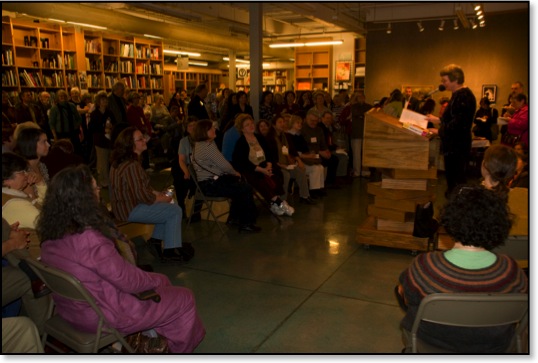
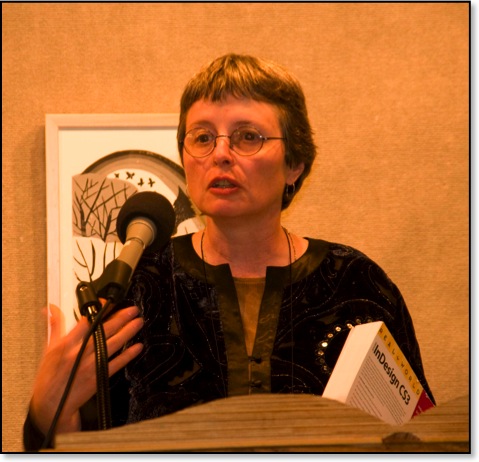

I want to thank this year’s Wilson Award Committee for honoring me and this book with the Wilson Award. And many thanks to H. W. Wilson for sponsoring the award. I know that the authors, Ole Kvern and David Blatner, are thrilled to see this index win as well. I want to thank PeachPit Press too, for supporting good indexing in their books. And not to make this sound like an Oscar speech, but I would like to thank my husband Chris for putting up with hard deadlines on books like these, and always cooking me dinner.
You probably would walk right past this manual, browsing in the software section here in Powell’s. After all, there are probably 20 other books on the shelf next to it, all about InDesign. It looks a lot like those other books, other than its massive weight. But it’s not.
What makes it different? Time, a good work process, and humor. Time defines this book in many ways. I’ve known David for at least 15 years, and I used to work for Ole Kvern, over twenty years ago. I have indexed all of his books save one. Ole was the person who taught me most of what I know about book layout, design, and the publication process. The same file handling techniques, process and practices we developed together in the Aldus documentation department in the late 80’s served us well as we put this book together. We laughed a lot when we worked together then, and we still do.
Time, in another way, defines this book. Like all software books, this one was written under a rapidly-closing deadline. Software books like this one have a limited life span. InDesign CS4, the program, is already out, and the next edition of this book is out on the shelves as well. (Also by David and Ole, and also indexed by me. Be sure to go find it on the shelves, there may be some new jokes in it.) These trade books live and make money for a very short time, while they still match the current version of the software. It’s critical to get them out as quickly as you can, as close to the software release data as possible.
For this edition, I wound up being more involved than I usually am. David and Ole were trying to document new features, and were worried about making their deadlines. Adobe had changed the appearance of much of the software’s interface, which meant taking new pictures (what we call screenshots or screen captures) of every single dialog box, tool box, and palette. Ole contacted me about two months before the indexing was to begin, and asked if I would help them out by doing the screenshots they needed. Two chapters were done, but the rest needed work. Since it was Ole, I said yes, because we used to do exactly this kind of work at Aldus. How hard could it be?
A lot harder than when I was thirty-something. I needed to have both the PC version of the program and the Mac version of the program, so that we would have both platforms illustrated in the images. I needed to create intricate Photoshop files with masks or layers to import into InDesign so that a certain Import dialog box would appear, and I could capture it. I had to clean the borders and make sure the dialog box contents were appropriate for each procedure they illustrated. It may be time for tri-focals; those pixels on the screen are much smaller than they used to be when I was younger. But I managed and replaced the images for about 3/4 of the book, saving Ole and David some precious time to finish the writing they needed to get done.
Then it was time for the indexing. A good working process also defines this book and its index. As we always do, Ole and David provided PDFs with temporary page numbers, working as fast as possible. We didn’t embed this index – we couldn’t. This is the classic tradeoff: choosing to embed vs. working with standard indexing. Yes, it would be great to have this index embedded, but there is never any time for this series to get the embedding done. David and Ole truly need to have access to the files until the very last minute, and if I had embedded the index, I would need to be editing at the same time they needed the files to prepare for print production, do their final text ragging, fix small errors, and insert late-breaking text. So this is a standalone index. After all the books we have done together, we have a good process. We went back and forth as I noticed errors that could affect the layout, new PDFs were made and sent, and the index was handed off about a day before the book was to go to press.
I have created an index for several prior editions of this book. When I work on David and Ole’s books, I use the last edition’s index as a baseline, and update it in Cindex. This is not an easy task, as Adobe always shifts options around from pane to dialog box to panel, and the book’s content shifts to match the product’s new configuration. New features appear, others get merged together, some disappear. Names of options and features always change. But David and Ole keep the content in recognizable chunks as much as possible, and I can work through it in Page Number Order, deleting, adding, and updating, without much agony. I usually have Cindex add 1000 to the old page numbers, and then I go through and see what is still usable and what isn’t, correcting the page numbers for the new edition as I go.
It is a very full and complete index. One of my goals is to make the index as complete as I can, because I have a lot of sympathy for the readers. InDesign is a page layout and design program, software that I know fairly intimately because I did book layout for many years. InDesign users will be outputting their work, in color or in black and white, to paper, to film, to web formats, to epub or ebook formats, or directly to a printing press. I have experienced the horror of sending these kinds of files to a costly high-resolution commercial printer, only to find that one wrong option was clicked on, one that ruined the output. Ole and David spend a lot of time documenting each option that can seriously affect output and printing, and it is a complex business that their readers are trying to master. I try to index every named option they document, everything that it affects, and every task or function it is related to. I don’t do this level of indexing in many technical books I work on, because often these options are not documented as well, not to this level of detail. But in this manual, the critical options are heavily documented, so they are all indexed fully, by name and by task and functionality.
As I said at the beginning, time, process, and humor make this book what it is, and humor is the third reason that this book is special. David and Ole are droll and silly people, and they are in the software business. There’s a long history of drollness and dry wit in the industry, as well as the practice of hiding Easter eggs in software. You know what Easter eggs are; something special that displays when you press command-option-shift-tab and put your nose on the escape key – sometimes you are shown a little video from the programmers, or an animation, or a special screen. It’s a hidden treasure for you to find, and it’s one way programmers have fun. In this book, there are Easter eggs everywhere – pictures of David and Ole’s favorite character actors, anime styles, movies, H.P. Lovecraft references, Gilbert and Sullivan themes; there are a lot of personal hidden references throughout the book. So it is only fair that the index have its silly moments as well.
As I noted, I have done several editions of this book, all but one. One edition had to be done by another indexer, based on my index. That indexer took out all of the humor to save space, and for the first time, Ole and David got complaints about the index. Their readers wanted the humor back! So it has been restored, and has been silly every since. I know, many of these silly entries are passing mentions. They are perfect examples of what you should not be indexing. If you really want to know about werewolves, you aren’t going to find out much when you visit page 636. But it is my Easter egg, as it were, to keep the index as silly as the book is.
David has said that indexing books gives him indigestion. Ole says that hiring professional indexers is the only way to stay sane. Ole often has a gloomy outlook on life, as indicated on page 352 and David doesn’t want you to know about his lack of drawing abilities on page 358. Ancient typographers, elder space gods, Nigel from Spinal Tap, jerks who bump your arm, errant cosmic rays and the Seattle Mariners are all in here.
Time, process and humor are the backdrop of this book’s index. And now this book has been replaced on most shelves by Real World InDesign CS4 by Olav Martin Kvern and David Blatner, also indexed by me, also published by PeachPit Press. And it continues the tradition, with entries such as:
indexers
--eternal affection towards David and Ole, 550-551
--medication and, 550
--whims of, 564
Thanks again to Ole and David for letting me indulge my whims.


Real World InDesign Index on the web
04/23/09 11:00
Safari
Books Online is a service for readers of tech books,
offering access to as many as 10 titles on a virtual
bookshelf for a monthly fee. Members can swap books
on and off of their bookshelf, depending on what they
need to be referring to at the time.
While browsing their holdings, I came across Real World InDesign, a book you know is near and dear to my heart. The index is online, transformed into a Web index. You can click on the heading to go to a page. The "2nd" indicator indicates the second location for a topic.
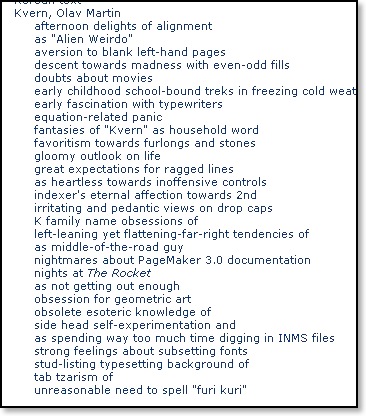
While browsing their holdings, I came across Real World InDesign, a book you know is near and dear to my heart. The index is online, transformed into a Web index. You can click on the heading to go to a page. The "2nd" indicator indicates the second location for a topic.

Indexing in InDesign
04/19/09 10:07
PeachPit
Press has put chapters from Real World InDesign
online, so that you can browse the book. And
surprise, surprise, they included the portion of the
book on
indexing!
Sitting down and indexing a book is—in our experience—the most painful, horrible, mind-numbing activity you could ever wish on your worst enemy. And yet, where this is the kind of task that a computer should be great at, it’s actually impossible for a computer to do a good job of indexing a book by itself. A good index requires careful thought, an understanding of the subject matter, and an ability to keep the whole project in your head at all times. In short, it requires comprehension—a quality computer software, at this early stage of its evolution, lacks. Until recently, it also required a large stack of note cards, highlighter pens, Post-It notes, and serious medication.
This is why I love Ole and David.
Hire a professional indexer. The author of a text is the worst person for the job. You simply know the material too well (or, if you don’t, why in the world did you write the book?) to create a useful index. A professional indexer will read and understand your text, and will create an index that opens it up to a wider range of possible readers than you ever could. It’s what they do.
Sitting down and indexing a book is—in our experience—the most painful, horrible, mind-numbing activity you could ever wish on your worst enemy. And yet, where this is the kind of task that a computer should be great at, it’s actually impossible for a computer to do a good job of indexing a book by itself. A good index requires careful thought, an understanding of the subject matter, and an ability to keep the whole project in your head at all times. In short, it requires comprehension—a quality computer software, at this early stage of its evolution, lacks. Until recently, it also required a large stack of note cards, highlighter pens, Post-It notes, and serious medication.
This is why I love Ole and David.
Hire a professional indexer. The author of a text is the worst person for the job. You simply know the material too well (or, if you don’t, why in the world did you write the book?) to create a useful index. A professional indexer will read and understand your text, and will create an index that opens it up to a wider range of possible readers than you ever could. It’s what they do.
InDesign indexing podcasts
03/30/09 09:32
Michael
Murphy has published a long series of podcasts on
building books in InDesign, and has two modules that
cover indexing in InDesign. Take a look.
Podcast number 36 and Podcast number 37
I have to say, he needs our help in his approach, content- and phrasing-wise, but these cover the technical aspects of making entries, choosing page range options, and generating an index.
Podcast number 36 and Podcast number 37
I have to say, he needs our help in his approach, content- and phrasing-wise, but these cover the technical aspects of making entries, choosing page range options, and generating an index.
H.W. Wilson Award
03/22/09 10:12
From: Peg Mauer
To: Index-l listserv
Subject: 2009 ASI/H.W. Wilson Excellence in Indexing Award
Date: Mar 21, 2009 5:24 PM
I am thrilled to announce that this year’s recipient of the ASI/H.W.
Wilson Award in Excellence in Indexing is Jan Wright, for her index to
Real World Adobe InDesign CS3, by Olav Martin Kvern and David Blatner.
The book was published by Peachpit Press in 2008. It is the first time
a technical manual has won the award!
Congratulations Jan!
The Wilson Award Committee was impressed by the detailed level of
granularity at which the index was written. Every conceivable utility,
button, dialog box and menu item was covered in the index. In addition
to the granularity, the coverage of the index was exhaustive. There did
not appear to be a single concept in the text that was not
appropriately covered in the index. Also, as is so important in a
technical manual's index, not only were software features indexed, but
actions were as well. That allows users to find information on how to
use features not just descriptions of them.
Index entries were appropriately double- or even triple-posted,
ensuring multiple access points to information. The index was written
in a concise, direct style, resulting in an index with a scientific
elegance. Generally short lines, along with a layout that used lots of
white space made for easy reading, even at the relatively small font
size. Finally, the authors' use of humor was consistently represented
in the index, which is not always an easy thing to carry off.
Jan will receive the Wilson Award, including a plaque and a check for
$1,000, at the ASI Welcome Reception on Thursday, April 23, 2009 at
Powell's City of Books in Portland, Oregon.
The Wilson Award also recognizes the contribution of the publisher to
the quality of the index. The publisher, Peachpit Press, also receives
a plaque.
The ASI/Wilson Award was established to recognize the normally
anonymous indexers and the publishers who provide high-quality indexes
to serve their readers. For more information on the H.W. Wilson Award,
see http://www.asindexing.org/site/WilsonAward.shtml. As you create
indexes this year, please consider the criteria for the award. Next
year, you could be the winner!
Thanks to all who submitted indexes this year. See you in Portland!
Peg Mauer
Chair, 2009 H.W. Wilson Award Committee
You can browse the index here at Amazon. Use the "Look Inside This Book" feature, and you can browse the index. I will probably be intolerable for a while, intolerable!
To: Index-l listserv
Subject: 2009 ASI/H.W. Wilson Excellence in Indexing Award
Date: Mar 21, 2009 5:24 PM
I am thrilled to announce that this year’s recipient of the ASI/H.W.
Wilson Award in Excellence in Indexing is Jan Wright, for her index to
Real World Adobe InDesign CS3, by Olav Martin Kvern and David Blatner.
The book was published by Peachpit Press in 2008. It is the first time
a technical manual has won the award!
Congratulations Jan!
The Wilson Award Committee was impressed by the detailed level of
granularity at which the index was written. Every conceivable utility,
button, dialog box and menu item was covered in the index. In addition
to the granularity, the coverage of the index was exhaustive. There did
not appear to be a single concept in the text that was not
appropriately covered in the index. Also, as is so important in a
technical manual's index, not only were software features indexed, but
actions were as well. That allows users to find information on how to
use features not just descriptions of them.
Index entries were appropriately double- or even triple-posted,
ensuring multiple access points to information. The index was written
in a concise, direct style, resulting in an index with a scientific
elegance. Generally short lines, along with a layout that used lots of
white space made for easy reading, even at the relatively small font
size. Finally, the authors' use of humor was consistently represented
in the index, which is not always an easy thing to carry off.
Jan will receive the Wilson Award, including a plaque and a check for
$1,000, at the ASI Welcome Reception on Thursday, April 23, 2009 at
Powell's City of Books in Portland, Oregon.
The Wilson Award also recognizes the contribution of the publisher to
the quality of the index. The publisher, Peachpit Press, also receives
a plaque.
The ASI/Wilson Award was established to recognize the normally
anonymous indexers and the publishers who provide high-quality indexes
to serve their readers. For more information on the H.W. Wilson Award,
see http://www.asindexing.org/site/WilsonAward.shtml. As you create
indexes this year, please consider the criteria for the award. Next
year, you could be the winner!
Thanks to all who submitted indexes this year. See you in Portland!
Peg Mauer
Chair, 2009 H.W. Wilson Award Committee
You can browse the index here at Amazon. Use the "Look Inside This Book" feature, and you can browse the index. I will probably be intolerable for a while, intolerable!
David's blog about the award is here.
Mike Shatzkin on the book world in 10 years
03/19/09 09:37
I'm not so
sure I want to post this, but where will indexing
play a role in this forecast?
There is no doubt that the industry is in a period of significant transition. What can we expect 10 to 15 years from now?
Someday, all data and applications will be “in the cloud”—that is, existing independently from, but accessible by, digital devices. All the devices most used every day will then need almost no memory. When we say “screens” in that context, it will mean the same thing as saying “devices” or “computers.” The screens of the future will all connect to all the information and all the computing power all the time.
So, media consumption will take place by people choosing from a wide variety of screen configurations, the way they have always chosen from a wide variety of printed formats. That is, you’ll pick up one kind of screen/device to read a memo you’re working on, another one to look at the work of your favorite photographer, and pull a rolled-up one out of your back pocket to read a book or newspaper on the subway or at the beach. And those don’t include the ones on your walls for a movie, or for a piece of art.
Books don’t have to immediately disappear from a world like that. Print-on-demand (POD) technology means that anybody can have anything they want in book form, down to a press run of one. David Worlock of Outsell, the sagest digital (and longest-standing) guru I know, once told me, “Surely, in time, the number of books created within the network (by individuals via the Internet) must exceed the number of books created outside the network.” If you look at what SharedBook is doing now—enabling personalized books to be created and displayed as flipbooks online, downloaded as PDFs, or printed on-demand—you see the down payment on Worlock’s vision.
There's a lot more at bookbusinessmag.com.
There is no doubt that the industry is in a period of significant transition. What can we expect 10 to 15 years from now?
Someday, all data and applications will be “in the cloud”—that is, existing independently from, but accessible by, digital devices. All the devices most used every day will then need almost no memory. When we say “screens” in that context, it will mean the same thing as saying “devices” or “computers.” The screens of the future will all connect to all the information and all the computing power all the time.
So, media consumption will take place by people choosing from a wide variety of screen configurations, the way they have always chosen from a wide variety of printed formats. That is, you’ll pick up one kind of screen/device to read a memo you’re working on, another one to look at the work of your favorite photographer, and pull a rolled-up one out of your back pocket to read a book or newspaper on the subway or at the beach. And those don’t include the ones on your walls for a movie, or for a piece of art.
Books don’t have to immediately disappear from a world like that. Print-on-demand (POD) technology means that anybody can have anything they want in book form, down to a press run of one. David Worlock of Outsell, the sagest digital (and longest-standing) guru I know, once told me, “Surely, in time, the number of books created within the network (by individuals via the Internet) must exceed the number of books created outside the network.” If you look at what SharedBook is doing now—enabling personalized books to be created and displayed as flipbooks online, downloaded as PDFs, or printed on-demand—you see the down payment on Worlock’s vision.
There's a lot more at bookbusinessmag.com.
Cheer up, we could be indexing on this!
03/10/09 07:46
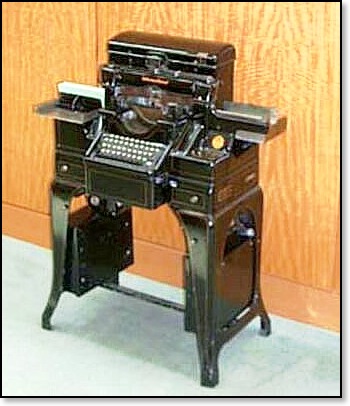
The IBM Attic site has great pictures of old calculating machines, numerators, and even a replica of the Babbage engine. There are three archives, be sure to explore all of them!
On reading, not reading, and reading for indexing
03/09/09 10:59
In response
to Pierre Bayard's
How to Talk About Books You Haven't Read,
Mandy Brown writes:
One of Bayard's arguments in How to Talk About Books is that the difference between reading and not reading is hard to pinpoint. If I only skim a book, does that count as reading or not reading? If I read a book years ago, but can no longer remember it, isn't that more akin to a state of not reading than of reading? Or, what if I have never opened a particular book, but can still speak about it authoritatively, because I know what other books it is similar to (or, put another way, I know its location in the library and what it means to be in that place) – is that a book that I have read, or a book that I have not read? Does it matter?
Someone with whom I spend a great deal of time is a significantly less avid reader than I am. Our arrangement is such that I read vigorously – making numerous recommendations about which books he should read – wherein he reads about one out of every dozen or so books I push in his direction. And yet a strange consequence of this coupling is that he can speak as authoritatively and compellingly as I can about books of which he has never so much as cracked the spine. It's as if I'm reading for two, and the act of reading expands from the initial contact (me, alone, with book in hand) to the later event (the two of us, talking about books, drinking wine). In a certain sense, he has read these books, in that he is as familiar with them (albeit through different means) as I am.
Underneath this theory of reading is an elevation of the ideas that a book espouses over the experience of reading it. The challenge I see therein is that ideas cannot be completely decoupled from the act of reading – cannot escape the material condition of the written language from which they are born. For me, especially, an idea must be judged in part on the merits of the words that describe it. The best ideas are therefore married to the most beautiful language; a divorce diminishes them both.
As indexers, we do more reading than the average soul, and yet, how much do we really absorb? I have noticed that when the material is technical, I absorb and keep nearly none of it within a month. But I do retain some - when our water purifier was behaving oddly, all the plumbing engineering indexing I have done led me to conclude it was a pressure issue, and lo and behold, it was. It didn't mean I could fix it, though! I retained the theory, but I didn't have the know-how, most likely because the engineering work I do contains formulas and applications in the broad sense, not specific valve issues under the sink.
When the material is fiction, the book itself dictates how much I retain, whether I got involved, lost myself, or got bored easily. But when the book is read with my book club, no matter what genre, I come away with a sense of owning it, it becomes a special book due to the act of sharing, and I retain all of those. The interaction and sharing of a book seems to mean I get to "keep" it.
When my indexing material is anthropological, historical, natural history, botany, biographical, or in other words very directly related to humans or nature, I retain a lot of it. Perhaps because it links into my experiences as a human, and whether I share it or not doesn't matter?
I'm wondering how the rest of you feel. How much do you retain? Is there a subject that stays with you longer?
One of Bayard's arguments in How to Talk About Books is that the difference between reading and not reading is hard to pinpoint. If I only skim a book, does that count as reading or not reading? If I read a book years ago, but can no longer remember it, isn't that more akin to a state of not reading than of reading? Or, what if I have never opened a particular book, but can still speak about it authoritatively, because I know what other books it is similar to (or, put another way, I know its location in the library and what it means to be in that place) – is that a book that I have read, or a book that I have not read? Does it matter?
Someone with whom I spend a great deal of time is a significantly less avid reader than I am. Our arrangement is such that I read vigorously – making numerous recommendations about which books he should read – wherein he reads about one out of every dozen or so books I push in his direction. And yet a strange consequence of this coupling is that he can speak as authoritatively and compellingly as I can about books of which he has never so much as cracked the spine. It's as if I'm reading for two, and the act of reading expands from the initial contact (me, alone, with book in hand) to the later event (the two of us, talking about books, drinking wine). In a certain sense, he has read these books, in that he is as familiar with them (albeit through different means) as I am.
Underneath this theory of reading is an elevation of the ideas that a book espouses over the experience of reading it. The challenge I see therein is that ideas cannot be completely decoupled from the act of reading – cannot escape the material condition of the written language from which they are born. For me, especially, an idea must be judged in part on the merits of the words that describe it. The best ideas are therefore married to the most beautiful language; a divorce diminishes them both.
As indexers, we do more reading than the average soul, and yet, how much do we really absorb? I have noticed that when the material is technical, I absorb and keep nearly none of it within a month. But I do retain some - when our water purifier was behaving oddly, all the plumbing engineering indexing I have done led me to conclude it was a pressure issue, and lo and behold, it was. It didn't mean I could fix it, though! I retained the theory, but I didn't have the know-how, most likely because the engineering work I do contains formulas and applications in the broad sense, not specific valve issues under the sink.
When the material is fiction, the book itself dictates how much I retain, whether I got involved, lost myself, or got bored easily. But when the book is read with my book club, no matter what genre, I come away with a sense of owning it, it becomes a special book due to the act of sharing, and I retain all of those. The interaction and sharing of a book seems to mean I get to "keep" it.
When my indexing material is anthropological, historical, natural history, botany, biographical, or in other words very directly related to humans or nature, I retain a lot of it. Perhaps because it links into my experiences as a human, and whether I share it or not doesn't matter?
I'm wondering how the rest of you feel. How much do you retain? Is there a subject that stays with you longer?
Some people do talk about indexes
02/22/09 09:42
Besides
indexers, I mean.
I wandered through Nothing but Bonfires to find this almost novel-esque discussion.
"Hey Hol, did you know that both 'indexes' and 'indices' are correct?"
"Uh, yes. Actually, I think I did know that."
"Well, don't you think that's kind of unfair?"
"Unfair? What do you mean, unfair?"
"Well, say you use 'indices' in conversation. Then people know that you know a little something, right?"
"Right."
"But if you can say 'indexes' as well, and it's still correct, then that seems like sort of a cop-out. No-one's going to be impressed with 'indices' anymore. They're not going to think that you know a little something. They're just going to think you're the kind of tool who says things like 'indices' when 'indexes' will do just as well."
It's nice to know someone talks about indexes. The ebook lack of consciousness has been making me blue.
I wandered through Nothing but Bonfires to find this almost novel-esque discussion.
"Hey Hol, did you know that both 'indexes' and 'indices' are correct?"
"Uh, yes. Actually, I think I did know that."
"Well, don't you think that's kind of unfair?"
"Unfair? What do you mean, unfair?"
"Well, say you use 'indices' in conversation. Then people know that you know a little something, right?"
"Right."
"But if you can say 'indexes' as well, and it's still correct, then that seems like sort of a cop-out. No-one's going to be impressed with 'indices' anymore. They're not going to think that you know a little something. They're just going to think you're the kind of tool who says things like 'indices' when 'indexes' will do just as well."
It's nice to know someone talks about indexes. The ebook lack of consciousness has been making me blue.
Just subtract a bit and the index will work
01/12/09 15:46
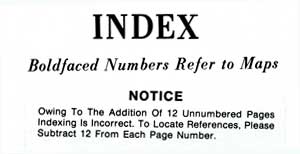
From "Tracking Ghost Railroads of Colorado" by Robert M. Ormes. 1975 Century One Press, Colorado Springs.
Indexing the Golden Bough
01/11/09 15:48
YouTube
has a slightly fuzzy representation of how Sir James
Fraser compiled his notes and wrote The
Golden Bough, essentially by index
slips.
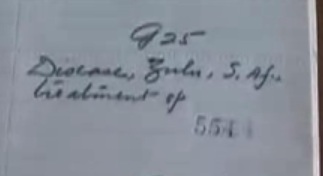
Jack London and Jules Verne
01/03/09 15:52
"We are surely not surprised to learn that Jules Verne gathered and systematically stored information in the fields of geography, natural science, and technology in his well organized collection of 20,000 cards and excerpts. However, it is somewhat unexpected to find, upon visiting the country house of Jack London in Glen Ellen near San Francisco, 188 card-index boxes alongside the writing desk of this writer who had an image of sailor, trapper, and adventurer."
-- V. Stibic, Tools of the Mind, Techniques and Methods for Intellectual Work, p. 77.
Love-lorn truffles and other delights
01/02/09 15:53
The
index to The Stuffed Owl: An Anthology of Bad
Verse contains so many delightful entries.

Why do I never get such books to index?

Why do I never get such books to index?
Tagging vs. indexing
12/28/08 15:57
The use of
tags by readers has skyrocketed. According to the Pew
Internet and American Life Project, January 2007, one
third of U.S. Internet users (42 million Americans)
had tagged some form of online content. 10 million
Americans (7% of Internet users) are tagging content
daily. (Gary
Smith, Tagging, p. 18)
Here's a new study analyzing tagging practices. Is this "indexing by mob" or is it a valuable source of vocabulary?
PS. I really really recommend this book.
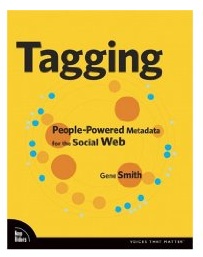
Here's a new study analyzing tagging practices. Is this "indexing by mob" or is it a valuable source of vocabulary?
PS. I really really recommend this book.

More fun indexing
12/24/08 16:00
Mr. Bunny's Big Cup O Java is a great title just
by itself. But will the index live up to that title?
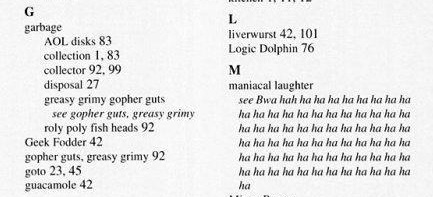
How many entries can there be under "Bwa haa haa haa haa...."?

How many entries can there be under "Bwa haa haa haa haa...."?
Cool online index
12/22/08 16:02
Orion
Studios has a very nice help system posted on the
web, with a real online index. Wait for it to load,
and then click the index panel. It's nice to see
people taking the time and effort to build an index
in this interface.
Index, Atlantic Monthly, humor of
12/18/08 16:03
Jokes about indexers
12/16/08 16:04
Tongue-in-cheek indexing
12/09/08 16:11
Hugh
Trevor-Roper takes revenge on his Cambridge college
via the the index:
Peterhouse Blues posting by Henry Farrell. The comments contain some hilarity.
"The index entry for ‘Cambridge Colleges, Peterhouse’ betrayed uncanny parallels, some believed, with Trevor-Roper’s perception of its members in the 1980s: ‘high-table conversation not very agreeable . . . four revolting fellows of; main source of perverts’. Just as admirers of his hero Gibbon often head straight for the footnotes, so the first port of call for connoisseurs of Trevor-Roper is the index."
Peterhouse Blues posting by Henry Farrell. The comments contain some hilarity.
